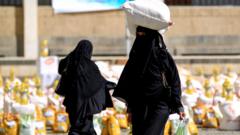The recent decision to suspend humanitarian operations in Yemen underscores critical safety challenges as the U.N. grapples with ongoing staff detentions amidst a deepening humanitarian crisis.
U.N. Halts Humanitarian Operations in Northern Yemen Amid Staff Detentions

U.N. Halts Humanitarian Operations in Northern Yemen Amid Staff Detentions
The United Nations suspends humanitarian aid in Houthi-controlled areas after multiple detainments of its personnel, escalating concerns over safety and aid access.
The article text:
In a significant escalation of tensions, the United Nations announced the suspension of all humanitarian work in the Houthi-controlled regions of northern Yemen due to the arbitrary detention of its staff. U.N. Secretary-General António Guterres made this decision following the arrest of eight more U.N. personnel in late January, raising the total number detained since 2021 to 24, according to U.N. spokesman Farhan Haq. The detentions were characterized by the U.N. as violations of a December agreement with the Houthis, aimed at ensuring the safety of its personnel and fostering an environment conducive to aid delivery.
The U.N.'s stance reflects a growing concern over the safety of its workers in Yemen, where the Houthis, backed by Iran, have become the de facto authorities in significant areas including the capital, Sana. The group has been accused of executing a campaign of kidnappings and detaining hundreds associated with the U.N. and foreign NGOs, compounded by the apprehension of many Yemenis linked to past U.S. government employment.
Haq remarked that the recent detentions of U.N. staff occurred on vague accusations of espionage and foreign intervention, raising alarms about the trustworthiness of the local environment for humanitarian initiatives. In light of these developments, U.N. operations including the crucial provision of food, clean water, and medical supplies will be halted, significantly impacting Yemen's population, where around 80 percent—approximately 24.1 million people—are in dire need of assistance.
With three million people displaced amid what the U.N. describes as the world's largest humanitarian crisis, the decision to cease operations highlights the challenging landscape of delivering aid in a conflict-ridden region. The U.N. has refrained from disclosing the exact number of Yemenis affected by this suspension but emphasized that the call for a temporary halt stems from an urgent need to prioritize the safety of its worker's amid deteriorating conditions.
In a significant escalation of tensions, the United Nations announced the suspension of all humanitarian work in the Houthi-controlled regions of northern Yemen due to the arbitrary detention of its staff. U.N. Secretary-General António Guterres made this decision following the arrest of eight more U.N. personnel in late January, raising the total number detained since 2021 to 24, according to U.N. spokesman Farhan Haq. The detentions were characterized by the U.N. as violations of a December agreement with the Houthis, aimed at ensuring the safety of its personnel and fostering an environment conducive to aid delivery.
The U.N.'s stance reflects a growing concern over the safety of its workers in Yemen, where the Houthis, backed by Iran, have become the de facto authorities in significant areas including the capital, Sana. The group has been accused of executing a campaign of kidnappings and detaining hundreds associated with the U.N. and foreign NGOs, compounded by the apprehension of many Yemenis linked to past U.S. government employment.
Haq remarked that the recent detentions of U.N. staff occurred on vague accusations of espionage and foreign intervention, raising alarms about the trustworthiness of the local environment for humanitarian initiatives. In light of these developments, U.N. operations including the crucial provision of food, clean water, and medical supplies will be halted, significantly impacting Yemen's population, where around 80 percent—approximately 24.1 million people—are in dire need of assistance.
With three million people displaced amid what the U.N. describes as the world's largest humanitarian crisis, the decision to cease operations highlights the challenging landscape of delivering aid in a conflict-ridden region. The U.N. has refrained from disclosing the exact number of Yemenis affected by this suspension but emphasized that the call for a temporary halt stems from an urgent need to prioritize the safety of its worker's amid deteriorating conditions.


















